5
Followers
33
Following
Pants' Books & Stuff!
Hi there! I imagine you must be wondering what the heck is up with my blog name. The short answer is, Pants has become my internet handle in a lot of places where I hang out (somehow).
I mainly read YA and comics, and I also frequently read speculative fiction of pretty much any kind. My other hobbies include watching anime and playing video games.
Other random tidbits: I have a Bachelor's degree in English Literature and a Masters in Library and Information Sciences. I also have an affinity for tea.
 I loved how this work tackled the transitory nature of friendship; it's such a human story despite being about a dog and his robot. Friends come and go, and often it's sad, and people don't MEAN to drift, but they do. And when you see that person again down the line?? A lot of the time it's okay -- it doesn't diminish or erase the friendship you once had with that person, but it's also okay to move on and just hold onto those memories.
I loved how this work tackled the transitory nature of friendship; it's such a human story despite being about a dog and his robot. Friends come and go, and often it's sad, and people don't MEAN to drift, but they do. And when you see that person again down the line?? A lot of the time it's okay -- it doesn't diminish or erase the friendship you once had with that person, but it's also okay to move on and just hold onto those memories. The last two pages nearly slayed me; they were a perfect blend of melancholic but equally hopeful and happy and I couldn't believe that this unassuming book made me choke up. Oh yeah, and Sara Varon managed to pull all of this off without a single word--just pictures here. Highly recommended.
 While the art in this was super adorable and fun, I wasn't at all fond of the little vignettes. To me, a truly wonderful children's work is one that balances its appeal to both children as well as adults and this didn't deliver on the latter. The punchlines were either non-existent or just not funny. The activities included in the book were cute and a good idea considering the targeted age-group, so I thought that was clever.
While the art in this was super adorable and fun, I wasn't at all fond of the little vignettes. To me, a truly wonderful children's work is one that balances its appeal to both children as well as adults and this didn't deliver on the latter. The punchlines were either non-existent or just not funny. The activities included in the book were cute and a good idea considering the targeted age-group, so I thought that was clever. Overall, it was okay, but I'm not chomping at the bit for more. It was cute, but it didn't have that spark with me, which is too bad because I really wanted to love this. This would however be an awesome primer to DC superheroes for the younger (~4+ yrs) crowd, especially with parents who might be worried about objectionable content.
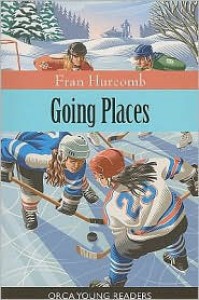 I liked this more than I thought I would -- while I appreciate what Orca publishing tries to do (publish short books in the hopes of luring in reluctant readers) they're still not my favourite so I wasn't expecting much here. I found myself enjoying learning about life in the Northwestern Territories though! I'm also not a hockey person, but the big game at the end of the book, while simply written, managed to convey excitement and I can see young readers (especially ones who enjoy hockey) getting caught up in it.
I liked this more than I thought I would -- while I appreciate what Orca publishing tries to do (publish short books in the hopes of luring in reluctant readers) they're still not my favourite so I wasn't expecting much here. I found myself enjoying learning about life in the Northwestern Territories though! I'm also not a hockey person, but the big game at the end of the book, while simply written, managed to convey excitement and I can see young readers (especially ones who enjoy hockey) getting caught up in it. The weakest point of the novel would definitely be the writing; it's very simple and could have used some better editing to smooth out some clunkiness (some of the sentences were awkward, or words were repeated within the same sentence), but there was still a love for the setting that shone through despite that which I appreciated greatly. The characters weren't very well drawn either; I couldn't tell anyone apart, outside of some defining trait (Kaitlin was the main character, Alice was the goalie, there were twins who were figure skaters, etc.). This is more of a story-driven kind of story anyway, so the book concerns itself much more with presenting a simple story of girls forming a girls-only hockey team while throwing in a short (and predictable) mystery into the mix.
All in all, while this was far from perfect (weak writing and characterization being the main problems), the setting and the author's obvious love for it drew me in and helped me enjoy this a lot more than I initially thought I would. The hockey elements were good and I'm sure will entice younger readers interested in that subject, and the little mystery thrown in keep things from getting too stale and boring.
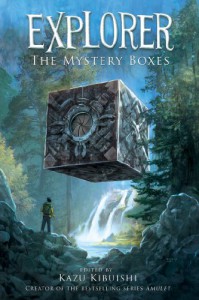
Introduction: I'm making up a pathfinder for good introductory graphic novel titles for older children (6-12 years; I also hope that it could be used as a list of core titles for librarians who might want some guidance) and I've found that it's actually an area in graphic novels I'm not very knowledgeable in. This title caught my eye it was edited by Kazu Kibuishi (of Amulet fame, which I have not read), and I've never read a graphic novel comprised of stand-alone short stories either, so I decided to give it a go and see if it would be a good pick for my pathfinder.
Under the Floorboards by Emily Carroll
This was deliciously creepy, but not so scary that it would scare off the intended audience (older children). The story kind of reminded me of a condensed version of Anya's Ghost I love Carroll's artstyle -- imagine Kate Beaton and Noelle Stephenson's artstyles having a love-child. (4/5)
Spring Cleaning by David Roman and Raina Telgemeier
I wanted to like this one more (I'm a fan of Telgemeier's work), but this one didn't grab me. In terms of tone and art style, it's quite different from the story that came just before it which was slightly jarring, and the narrative felt much more frantically paced and rushed. As always, I enjoyed Telgemeier's signature colourful and expressive art style, but a part of me was anticipating her doing something a little darker. (2.5/5)
The Keeper's Treasure by Jason Kafoe
This is a nice little fantasy piece that has a good dose of humour. I was a little torn on the art -- the line art for the protag was a little lacking, but the ogre-like character was wonderfully drawn and coloured. The backgrounds were also gorgeous, really bringing this little snapshot of the world to life. I was slightly confused by the "message" of the ending, but it was cute nonetheless. (3.5/5)
The Butter Thief by Rob Sechrist
Ohmigosh, the art in this story is CRAZY GOOD and beautiful to look at (though I wish there had been a bit more contrast in the colour and values). The story is very cute, though I am not at all familiar with the mythology it was based on (if it even was based on any real-world mythology, I'm not even `00% sure.) (4/5)
The Solder's Daughter by Stuart Livingston with Stephanie Ramirez
While the art in this was pretty solid, I wasn't so fond of the writing; it had an air of melodrama to it that felt too forced and almost laughable. The message of "WAR IS BAD FOR EVERYONE" is trite and overdone, though it may feel fresh and subversive for younger readers who haven't encountered these kinds of narratives yet. (2.5/5)
Whatzit by Joanne Matte with Saymone Phanekham
Loved the colourful and exaggerated art-style; it's wonderfully cartoony, clean and very professional. I am not at all surprised she did storyboards for Dreamworks (How to Drain Your Dragon) and Nickolodeon (Avatar: The Last Airbender). The story was super cute, and I loved the idea of everything in the universe being contained in boxes. It was impressive the amount of world-building Matte managed to fit into this short piece and without even really saying anything. (4/5)
The Escape Option by Kazu Kibuishi
Didn't really feel this one. I liked the art (it reminded me a lot of Kafoe's), but the story felt *too* clipped. Still, what Kibuishi managed to cram into such a short amount was impressive. (3/5)
Conclusion: For me, this collection was a little uneven (a risk all anthologies encounter), but I didn't despise any of the stories and I quite enjoyed others. The art was consistently solid, and the content was appropriate for the intended audience (while rarely being pandering or condescending). I'm still debating whether I'm going to include this on my pathfinder, but I think it's a good example of short stories in the graphic novel form.
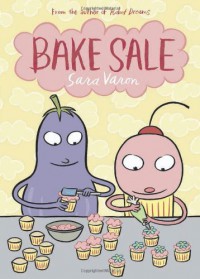 I was a little iffy on this one to start but by the end I was completely sold! This is a super cute story, though I can't really put into words what I liked about it so much; there's just something very charming about it. The art makes it almost a borderline comic, as many pages are comprised of only 2-3 panels, but this would make it great for children who are being introduced to graphic novels for the first time.
I was a little iffy on this one to start but by the end I was completely sold! This is a super cute story, though I can't really put into words what I liked about it so much; there's just something very charming about it. The art makes it almost a borderline comic, as many pages are comprised of only 2-3 panels, but this would make it great for children who are being introduced to graphic novels for the first time.My favourite part? That Varon included recipes for all the baked goods Cupcake makes throughout the story! If parents want to pick this up for their kids they could easily make it an interactive experience, or librarians could create some kind of program around it somehow; it just adds an extra layer to the reading experience that I think could be a lot of fun. :)
I'll definitely be checking out Varon's previous work Robot Dreams and I look forward to whatever she puts out next.
[As an aside, can I mention how I find it kind of bizarre how this world is populated by food, but they all obviously eat food (e.g. Cupcake bakes a carrot cake, but in the next scene a giant Carrot is serving him grilled cheese; or, Tomato picks up an order of cake, but later on Cupcake is buying tomatoes to use in his baking. This is just me over-thinking though, honestly.) This obviously didn't deter from my enjoyment of the work, but the thought wouldn't leave me alone!]
 Seriously, all cat lovers should read this. You will find something to relate to/love here 'cause the chances are you've experienced it before. I feel like Konami really captured the essence of a kitten: the playfulness, neediness, and silliness. The art, with its simple lines but exaggerated facial expressions (I loved the little details, like Chi's pupils dilating whenever she finds something she wants to play with) fit the tone of the work perfectly, and I loved that this was published all in colour to boot.
Seriously, all cat lovers should read this. You will find something to relate to/love here 'cause the chances are you've experienced it before. I feel like Konami really captured the essence of a kitten: the playfulness, neediness, and silliness. The art, with its simple lines but exaggerated facial expressions (I loved the little details, like Chi's pupils dilating whenever she finds something she wants to play with) fit the tone of the work perfectly, and I loved that this was published all in colour to boot. One of the great things about this title too is the appeal it could have for children. Chi's narration is written as if she speaks with a kind of lisp (e.g. "pwease", "miulk", etc.) and it could be fun to read this out loud and convey that affectation in her voice. And seriously, what kid doesn't like an adorable little kitten??
Definitely plan on reading the rest of this series.
 The nostalgia!! I don't know if I enjoyed this so much because I read the BSC books voraciously (in French as well as English) as a child, but this was a lot of fun!
The nostalgia!! I don't know if I enjoyed this so much because I read the BSC books voraciously (in French as well as English) as a child, but this was a lot of fun! Obviously, the biggest draw to reading this was that it was in a graphic novel/comic book format and Graphix couldn't have made a better choice than having Telgemeier at the illustration helm. Her art style is adorable and fits the tone of this series so well. She captured the essence of Kristy, Mary Ann, Claudia and Stacey with her designs and breathed new life into them. I was a little sad to see this in B&W (I've read Smile and Drama which were both coloured) but Telgemeier's line work is very strong and didn't suffer from the lack of colour. The panel structure is very simple and easy to follow, but it breaks things up once in awhile with little things like the girls' entries into their babysitting logbook (which mirrored how they did it in the books too).
The writing, while obviously based off Martin's text, was wonderfully adapted and didn't feel dated in the slightest (though the lack of cell phones may puzzle younger readers who are surrounded by that kind of thing--I would be surprised if it deterred one's enjoyment of the work though.) It's a fun, clean story that offers the usual bits about friendship and growing up which are plots that have obviously been tread many times before, but I found this had so much charm and heart that I enjoyed myself immensely while reading. I can't wait to get my hands on the next couple of volumes that are available! I'm curious how many Graphix is going to publish (but I hope it's a lot.)
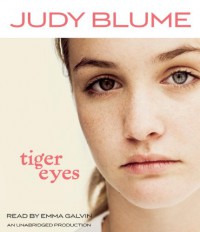 Loved this. I think listening to this on audio enhanced the experience for me--the narrator was fantastic. Her voice was affective and I was able to differentiate all the characters very easily.
Loved this. I think listening to this on audio enhanced the experience for me--the narrator was fantastic. Her voice was affective and I was able to differentiate all the characters very easily. Davey is a great character; she's prickly but loving; hurting and angry and desperate to reach out. Her thoughts and experiences felt so authentically teen and surprisingly relevant when one considers this was originally published in the early 80s; it has a timelessness that I think will carry over for many years to come.
This also abstains from delving into melodrama. It's certainly sad and definitely an exploration of griefbut in a beautifully subtle and understated way.
Highly recommended and I can't wait to see the movie!
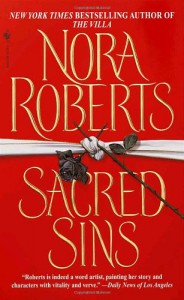 This wouldn't have been half as bad if the written hadn't been so deplorable. There were so many awkward sentences, and Roberts would just say things that didn't make sense (e.g. "her spine shuddered"* -- how the eff does a spine shudder??). The romance scenes were also some of the unsexiest things I've ever read ("he had spilled himself in her three times that night"** I have no problem with that kind of thing, but it was written as if trying to evoke something romantic/sexual/sexy and maybe this kind of thing does it for people?? I dunno.) I found the whole cop mentality vs. psychiatrist mentality boring, and I never bought the romance--it felt very contrived.
This wouldn't have been half as bad if the written hadn't been so deplorable. There were so many awkward sentences, and Roberts would just say things that didn't make sense (e.g. "her spine shuddered"* -- how the eff does a spine shudder??). The romance scenes were also some of the unsexiest things I've ever read ("he had spilled himself in her three times that night"** I have no problem with that kind of thing, but it was written as if trying to evoke something romantic/sexual/sexy and maybe this kind of thing does it for people?? I dunno.) I found the whole cop mentality vs. psychiatrist mentality boring, and I never bought the romance--it felt very contrived.But since I'm reading this for a Reader's Advisory assignment and I'm supposed to look for appeal factors (because people obviously enjoy Norah Roberts and other people have enjoyed this) I'm going to try to identify some:
- procedural plot; serial killer
- our protagonists don't initially see eye-to-eye but come to understand one another; their romance accompanies this trajectory
- written in an alternating third-person limited perspective (focuses on Ben and Tess but also dips into other characters); allows readers to be privy to the thoughts of both protagonists to experience their growth and change
- that's all I got (may add more as I think of them)
* recalling from memory, but it definitely involved shuddering spines
** also recall
 (Disclaimer: I don't normally read Romance. I'm in a Reader's Advisory class in grad school and we have an assignment where we have to read books in a genre that is outside our comfort zone. For me, that's Romance and it's definitely impacted my reading of this novel.)
(Disclaimer: I don't normally read Romance. I'm in a Reader's Advisory class in grad school and we have an assignment where we have to read books in a genre that is outside our comfort zone. For me, that's Romance and it's definitely impacted my reading of this novel.)There is absolutely nothing wrong with this, but Romance is seriously just not for me. This was good, fluffy fun (which I am certainly NOT opposed to), but MacLean liked to use the same words/expressions over and over again (I swear, if I had to read about "turgid nipples" or "lips of her sex" or "plundering of the mouth" one more time...) I was also frustrated by Gabriel's anger at Callie's exploits because if she were caught it would ruin her reputation (and thus his sister's), yet in the next moment he would be sexing her which I would imagine would be ruin her reputation far more thoroughly than being caught drinking scotch in a tavern.
What I did really like were the relationships between the women, especially between Callie, her sister Marianna and Gabriel's sister Julianna. I also appreciated that Gabriel's ex-mistress Nastasia defied expectations (she could so easily have fallen into a sort of "mean girl" trope and she doesn't.)
The sexy bits were good, but as I mentioned above, I found they began to feel repetitive. I was lukewarm about the central romance though I enjoyed the characters separately, and even together (their banter is quite fun at times.) This book isn't reinventing the wheel, but MacLean pulls off the tropes she's utilizing quite well -- they just happen to be tropes that I'm not into reading which obviously is no fault of hers.
Would I recommend it? To Historical Romance fans, most definitely. It has fun characters and I felt transported to 1800s England.
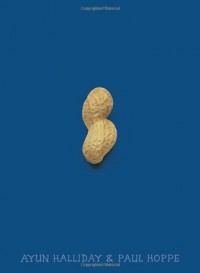 I'm leaning more towards a 1.5 because this work is largely inoffensive, but I still found it so uninspiring that I can't bring myself to bump it up to 2 stars.
I'm leaning more towards a 1.5 because this work is largely inoffensive, but I still found it so uninspiring that I can't bring myself to bump it up to 2 stars.But before I get into that, I think I should explain something a little more personal first: I suffer from food allergies (including peanuts.) A LOT of them. Thankfully, none of them are airborne (meaning I can smell things I'm allergic to and be okay -- I just can't eat them), and while some of them are SEVERE, they're not DEADLY like they are for most people. For those who are curious, here's a list of all the shit I'm allergic to: anything and everything peanuts, anything that lives underwater (some people are allergic to only shellfish, or fresh/saltwater fish, but I'm allergic to all of them), some tree fruit (I say "some" because I can eat things with thick rinds, like citrus, for some reason), and some milk products (this is one that baffles me -- I can eat MOST milk products, but things like 2% milk [I can drink skim] and cheddar cheese just do not sit with me; and I don't mean I'm lactose-intolerant btw -- my throat closes up when I eat those things). And here's the thing: no one gives a shit if you have allergies. Yes, they're *concerned* and it's something they'll hopefully keep in mind, especially if it's life-threatening, but no one's like "ommggggg an ALLERGY!! Wow that's so interesting!!" Especially peanut allergies; they're incredibly common.
The reason I mention this is because I was leery of the premise of this book from the start. Having lived with a peanut allergy all my life, it all sounded outlandish and ridiculous. And it was. It was also really hard to like Sadie when she has no personality outside of her lying ways. I don't mean to say that I disliked Sadie because she lied about something (we've all done that), but because Halliday didn't characterize her outside of being a liar, outside of giving her a little snark (which admittedly, did breathe a little life into her.) Her motivations for lying are never explored, which I think could have made for a much interesting story. Thankfully, the secondary characters DO have personality, so that was nice, and I appreciated the candid dialog between Sadie and her friends. Halliday skimmed over other issues though, such as why Cheryl started giving Sadie the cold shoulder. Was she trying to demonstrate that people just drift apart? If that's the case, it wasn't conveyed very effectively.
I also found a disconnect between the tone of the work versus the content. As a whole, the comic's tone feels Middle Grade (despite being set in high school), but then Halliday would through in things that are decidedly NOT MG, such as jokes about faking orgasm, or have Sadie give the middle finger. I have no objections to this kind of content, but it felt incongruous with the rest of the work. I think this was partly due to the art style, which brings me to my next point..
I hated the art. Hated it. The line art looks like a rough free-hand style and it just looks bad. The faces are oddly proportioned and are equally uninspiring. Sadie is always wearing an item of clothing that's coloured some peachy/pink colour, but it felt gimmicky and largely pointless. I guess it was some kind of metaphor for her desire to stand out? Either way, a burst of colour doesn't detract from how bad the art is as a whole.
Overall, I would have a very hard time recommending this to anybody. I don't know how much my personal history with allergies has to do with it, but I couldn't wrap my head around the plot, I found the characterization largely lacking, and the art often made me cringe. For graphic novels that deal with high school life, I much prefer Faith Erin Hicks's Friends With Boys or Vera Brogsol's Anya's Ghost (very different content, but similar in themes and setting.)
 I actually haven't read this cover-to-cover (I just skimmed the transcript of the interview with Vladek at the end), nor have I checked out the CD that comes with the book yet (though I plan to), but the bulk of this book, which is an interview between Hillary Chute and Art Spiegelman was *fantastic*. If you're a hardcore fan of Maus and are interested in Spiegelman's work in general, this is indispensable. Spiegelman is an incredibly intelligent and articulate man and reading about the creative process he undertook to create Maus is beyond fascinating. You'll learn: Why make a comic about the Holocaust? Why comics in the first place? And why draw the people as animals? So much thought went into this work, and reading this extensive interview was very enlightening and has made me respect Spiegelman so much more. It's also worth noting how much respect he truly has for the subject matter of his work: the Holocaust, and his concern with the construction of memory and his struggles with it when creating Maus.
I actually haven't read this cover-to-cover (I just skimmed the transcript of the interview with Vladek at the end), nor have I checked out the CD that comes with the book yet (though I plan to), but the bulk of this book, which is an interview between Hillary Chute and Art Spiegelman was *fantastic*. If you're a hardcore fan of Maus and are interested in Spiegelman's work in general, this is indispensable. Spiegelman is an incredibly intelligent and articulate man and reading about the creative process he undertook to create Maus is beyond fascinating. You'll learn: Why make a comic about the Holocaust? Why comics in the first place? And why draw the people as animals? So much thought went into this work, and reading this extensive interview was very enlightening and has made me respect Spiegelman so much more. It's also worth noting how much respect he truly has for the subject matter of his work: the Holocaust, and his concern with the construction of memory and his struggles with it when creating Maus.Along with the amazing interview, this book is also chock-full of beautiful picture strewn throughout: sketches, notes (further illuminating the creative process), and other (shorter) works by Spiegelman that demonstrate his inspirations and influences. I also appreciated that when Chute or Spiegelman referred to specific pages from Maus, they would provide those very page/s and/or panels for the reader to refer to, so that they could more easily understand and see what they were talking about.
Other awesome tidbits: there are interviews with Spiegelman's children (Nadja and Dash), and his wife Francoise Mouly; there's a detailed genealogy of the Spiegelman family that had an extensive family tree (the "Before the War" and "After the War" comparisons made me cringe.); the paper that this is printed on is very high quality, I love it.
Overall, this is a very extensive and thorough look at an amazing classic. Highly recommended.
 Hmm... I'm still unsure about this one. I wanted to like it more than I did, but it was still quite good overall. I think I'd rate it a 3.5 instead of just 3, but I don't like it so much I want to round up the rating either.
Hmm... I'm still unsure about this one. I wanted to like it more than I did, but it was still quite good overall. I think I'd rate it a 3.5 instead of just 3, but I don't like it so much I want to round up the rating either.What I Liked:
- Some may feel that the format of this book (it's written as a screenplay) is gimmicky, but I thought it was appropriate here. This story is supposed to be about moral ambiguity and whatnot, and I think that would have been hindered had readers been treated to the trial through prose. Technically, this is *still* Steve's POV (the screenplay is written by him) but I still felt like I was being given the facts. HOWEVER, had this been told from Steve's POV in prose, it could have accented the Unreliable Narrator even more heavily than it was done here.
- That last line at the ending (which I obviously won't spoil) was particularly striking.
- The novel never gives you any clear answers about how the crime really went down. I liked that there's so much room for interpretation, and this book would be great fodder for discussion with teens. Some of this novel might feel like emotional manipulation, but that's just it: Steve is writing the screenplay as a means to convince himself that he's not a Monster. Outside of that, I don't think the text is trying to manipulate readers to feel sympathy for Steve -- that could have been achieved much more easily using prose where there would have been room to explore Steve's character and the secondary characters more in-depth, as well as the social circumstances they find themselves in.
What I Wasn't as Crazy About:
- I'm not at all familiar with the American judicial system, but I find it strange that Steve could serve 25 years to life for participating in the holdup. Yes, it led to a death, but the punishment felt extremely harsh in light of the circumstances which kind of diluted the moral ambiguity for me a bit.
- The format of the novel, even with excerpts from Steve's journal really kept me from getting to know him. I didn't really feel invested in the outcome of the case; I was curious, but it was only a mild curiosity and not because I was concerned for Steve's well-being. This was compounded by the fact that Steve displayed absolutely no remorse/concern that this was happening to him because someone had DIED.
I can see why it won the Printz -- I wouldn't be surprised if this book was quite different from what was being published at the time -- but there was a disconnect with Steve's character that kept from loving it. However, I don't think I'd hesitate to recommend this to readers looking for stories that focus on moral ambiguity or are looking for unusual narrative formats.
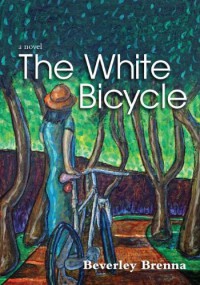 Read this one due to it receiving the Printz Honour.
Read this one due to it receiving the Printz Honour.Things I Liked:
- The first-person perspective truly read like someone with Aspergers (well, I don't have Aspergers so I wouldn't actually *know*, but it felt true to life.) Brenna presents Aspergers as a different way of living, not a deficient one and presents the ups and downs that come with it. Taylor still lives a full life, and watching try to achieve independence is not that different from a typical teen's, though it still has its differences.
- Mileage May Vary on this, but I personally enjoyed how introspective the novel was, to a degree. Seeing Taylor write out her thoughts and then analyze them, then later apply them to other situations she faces also felt incredibly true-to-life to. I guess this is just expanding on my first point.
- Taylor and her mother's relationship was very well-drawn. Taylor's frustrations with her mother's hovering and sometimes forceful behaviour are, again, relatable to a lot of teens, Aspergers or not. But even when Taylor claims to hate her mother, the reader knows she's not a BAD person. Both Taylor and her mother are easy to sympathize with because they're just doing the best they can with navigating each other's differing perspectives.
Things I Didn't Like As Much:
- I know I said I liked the introspective nature of the novel, but sadly this also led to it having very little plot. The sequences that dealt with Taylor remembering her childhood were quite good, but then others like the bits with Adelaide felt too short.
- It feels like Brenna is really beating readers over the head with the messages of existentialism, trying to under someone else's perspective and owning one's life. However, this same complaint also just feels like it would fit Taylor's voice (she repeats herself a lot, but it makes sense to her Asperger's), so I'm kind of on the fence about this one.
Overall, it's a decent novel but not one I found myself falling in love with. I would recommend this to readers who enjoyed The Curious Incident of the Dog in the Night-Time by Mark Haddon and Marcelo in the Real World by Francisco X. Stork.
 This one really caught me off guard -- it's far from perfect, but I found myself having a lot of fun while I read it.
This one really caught me off guard -- it's far from perfect, but I found myself having a lot of fun while I read it. Things I liked:
- Benway managed to convince me that Maggie was an unusual teen. And, even though she was a spy and never spent time around other teenagers and was obviously quite academically gifted, she was never made out to be better or more mature than other teens; her voice was still very authentically teenager-y.
- The dialogue was witty and often had me grinning. It wasn't laugh-out-loud funny, but Maggie's voice was incredibly endearing. I also appreciated Roux's snarky attitude.
- The presence of Maggie's parents. With Maggie being a spy and all, it could have been very easy to write the parents off somehow, but Benway highlights them. I loved the complicated relationship between Maggie and her parents: their job as spies has forced Maggie to grow up more quickly, and her isolation from other teens has kind of exacerbated that, so they've come to this crossroads where they treat Maggie like an adult and put undue pressure on her at some times, while simultaneously trying to rein her in and keep her safe as if she were still a child at others. And even though it's kind of complicated, you can still feel the love between the three of them.
- I like that Jesse (the love interest) was initially made out to be some kind of lame Bad Boy, but once Maggie gets to know him and the layers are peeled off, he's really not. He doesn't even TRY to act like a Bad Boy; people just assume he is because he skips school and tried to shoplift a book. His character is still nothing to write home about, but I appreciated that Benway didn't try to make him out to be an Asshole With a Heart of Gold.
- Angelo was also super awesome. And points that there's no fuss about him being gay.
- I've seen some reviews that have complained about the lack of Spy Stuff. I, personally, liked the approach Benway took here. Maggie isn't some International Super Spy (well, she sort of is); she's just really, REALLY good at picking locks. So that's what she does, and it's pretty much ALL she does. She knows a few other things like hacking and forging as well. I liked that the Spy Stuff wasn't particularly superfluous or over the top. Though I can see why that would be disappointing for people who were expecting that sort of thing.
Things I Didn't Like So Much:
- I wish The Collective had been more well-developed. I'm glad there wasn't some kind of info-dump explanation for it, but still.
- The romance between Maggie and Jesse. It was cute, but it evolved into "I love you"s and whatnot rather quickly.
- The story was rather predictable. I wasn't particularly invested in Maggie's mission, nor the mystery that eventually evolved from it; I was much more interested in the personal relationships between Maggie and her private school friends, and her parents.
So as you can see, there was a lot here I liked. Which surprised me because I thought this was going to be rather 'blah'. I was reading purely because it was written by Benway and I liked her debut Audrey, Wait! (her sophomore book, not so much.) But the narrative voice and the characters really won me over.





